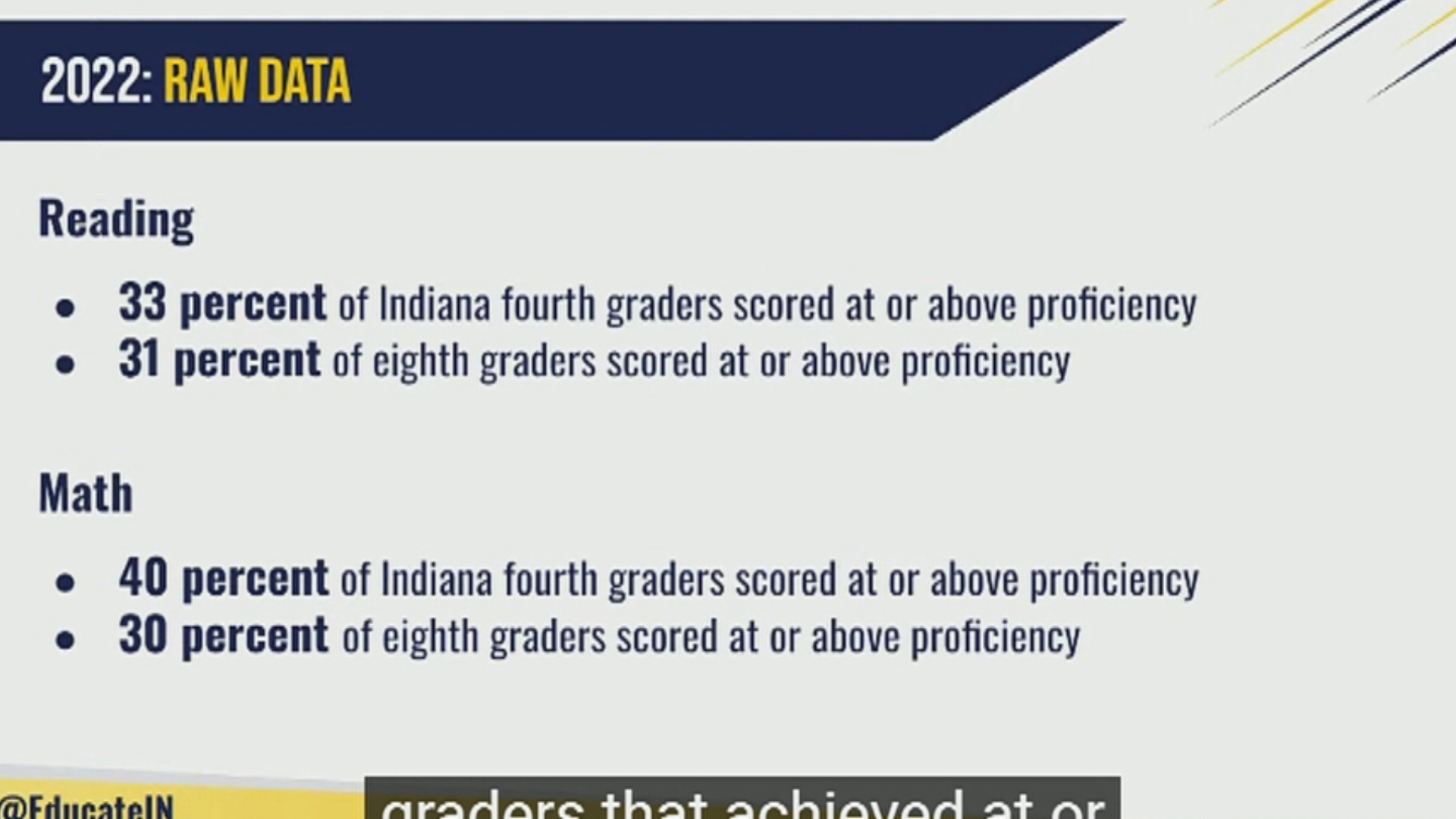State Board of Education want to streamline Indiana Academic Standards
INDIANAPOLIS (WISH) — The Indiana Department of Education (IDOE) provided an update to the Indiana State Board of Education about the National Assessment of Educational Progress test scores for the state and streamlining the Indiana Academic Standards.
Known as the “Nation’s Report Card,” on education, the National Assessment of Educational Progress (NAEP) Progress provides the only academic comparable data point the country has from state to state and within U.S. territories. It measures overall performance for key student populations, the change of that over time and the differences between the nation, states and urban districts.
Chief Academic Officer, Dr. Charity Flores held a presentation on the NAEP data and what it means for Indiana.
RELATED: Educational professionals weigh in on Indiana’s results from “Nation’s Report Card”
“We can look at this data and think through different policy initiatives that may have been undertaken at different points in time and most recently it also allows for us to reflect on the academic impact that we also observed with ILEARN and IREAD 3 results,” Dr. Flores said.
The raw data showed that:
READING
- 33% of Indiana 4th graders scored at or above proficiency
- 31% of Indiana 8th graders scored at or above proficiency
MATH
- 40% of Indiana 4th graders scored at or above proficiency
- 30% of Indiana 4th graders scored at or above proficiency
Indiana was 1 of 17 states that performed significantly higher than the national average for 4th grade math.
Indiana was 1 of 30 states whose performance was not significantly different than the national average for 8th grade math.
“Indiana is typically above national average in reading and math. We are still above national average in math. Reading, that gap is closing, but looking into what Dr. Flores pointed out from 2011 to 2013 that’s when we saw the gap widen in the state and you can see that gap narrowing specifically between 2017 and 2019. You see a significant narrowing where the nation went up and Indiana went down. We all know the impacts of COVID, so many times people talk about it’s all caused by COVID, it’s all caused by the pandemic and that’s just not a completely accurate narrative,” said State Secretary of Education, Dr. Jenner.
She said as a state they were seeing some downward trends prior to.
“In 4th grade math, Indiana is ranked 8th in the nation when you look at states only and not territories, but the caveat is you can’t look at that 8th just at the surface because of the statistical significance. While we might be 8th, we’re about the same as those 16 other states. So one point away, and it’s the same,” Dr. Jenner said.
Some key things that stuck out according to Dr. Flores is while 4th and 8th grade students scored above the national average in math, they saw some of the largest drops in 4th grade math compared to the nation. Indiana has been above the national average for nearly a decade in reading , however 4th grade reading scores have been declining since 2015.
Comparable to the ILEARN and IREAD-3 state assessments, overall proficiency for specific student populations (Black, Hispanic, and students who received free or reduced meals) remains low in both reading and math and requires intentional, targeted support.
That’s when they transitioned to speaking about an update on House Enrolled Act (HEA) 1251.
HEA called upon the Indiana Department of Education to identify the key skills and traits necessary for students to be successful after high school graduation. As a result, IDOE launched a comprehensive research effort.
- Literature review of scholarly articles and papers
- Analysis of other states and their use of employability skills
- A scan of postsecondary institutions and national organizations
- Facilitation of Indiana focus groups with representatives from employment, enlistment and enrollment
- The dissemination and analysis of a survey completed by participants across the state
Indiana’s Academic Standards are designed to help educators, parents, students and community members understand what students need to know and be able to do at each grade level, and within each content strand in order to exit high school college and career ready. While the standards have identified the academic content or skills that Indiana students need to be prepared for both college and career, they are not an exhaustive list. How each standard is taught in curriculum is determined at the local level.
The department wants to begin the process of streamlining Indiana’s Academic Standards to focus on the essential knowledge and skills while promoting a rigorous learning environment.
Dr. Flores said their goal is to streamline the standards in 2022-2023 so they can launch for implementation in 2023-2024 and the potential assessment would align in 2025-2026.
